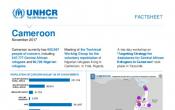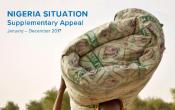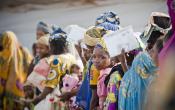Cameroon
Operation: Cameroon
Location
{"longitude":12,"latitude":5,"zoom_level":0}
Latest update of camps and office locations 21 Nov 2016. By clicking on the icons on the map, additional information is displayed.
Key Figures
| 2018 planning figures | |
| 40,000 | Central African refugees will receive cash grants to allow them to return to their country of origin in the framework of voluntary repatriation |
| 29,000 | Nigerian refugees in Minawao camp will receive core relief items |
| 14,500 | Nigerian children will be enrolled in primary school |
| 1,765 | kilocalories, on average, per person per day will be distributed to Central African refugees |
| 20 | health facilities will be equipped/constructed/rehabilitated for Central African refugees and host populations |
| 2016 end-year results | |
| 100% | of people of concern were registered on an individual basis |
| 72% | of Central African refugee women have been supplied with sanitary material |
| 56% | of Central African refugee children enrolled in primary school |
| 15% | of internally displaced households lived in adequate dwellings |
| 315 | reported incidents for which survivors receive material assistance |
Latest Updates and Related Links
January - December 2017
People of Concern
30%
Increase in
2016
2016
| 2016 | 595,935 |
| 2015 | 459,650 |
| 2014 | 276,265 |

[["Refugees",348672],["Refugee-like situation",26743],["Asylum-seekers",3251],["IDPs",198889],["Returned IDPs",18213],["Returned refugees",134],["Others of concern",33]]
Loading ...
Cameroon
< Back
2016
{"categories":[2013,2014,2015,2016,2017,2018],"budget":[23.58358842,81.27658602,114.697643602,98.624602509,94.24482876,86.727806205],"expenditure":[12.96600018,44.17872352,50.71501571,50.50994132,null,null]}
{"categories":[2013,2014,2015,2016,2017,2018],"p1":[22.80065742,80.48365484,107.653576378,89.476459699,87.79606214,81.169771383],"p2":[0.782931,0.79293118,0.843987224,1.885381,1.14850401,0.530532513],"p3":[null,null,null,null,null,null],"p4":[null,null,6.20008,7.26276181,5.30026261,5.027502309]}
{"categories":[2013,2014,2015,2016,2017,2018],"p1":[12.84369964,44.04089519,45.95148629,46.39734147,null,null],"p2":[0.12230054,0.13782833,0.207295,1.36677006,null,null],"p3":[null,null,null,null,null,null],"p4":[null,null,4.55623442,2.74582979,null,null]}
Loading ...
CHOOSE A YEAR
- 2014
- 2015
- 2016
- 2017
- 2018
Year-end Overview
Plan Overview
Working environment
UNHCR anticipates the protection environment for refugees in Cameroon to become more challenging in 2018. The spill-over effect and increased insecurity in border areas resulting from conflicts in Central Africa Republic (CAR) and Nigeria, coupled with the possibility of political tensions surrounding upcoming elections, can shrink the humanitarian space further. In addition, continuous demographic pressure on natural resources and social services continue to cast a level of uncertainty on peaceful coexistence, thus having a negative impact on the protection space for refugees. The prospects for return and other durable solutions are limited and the presence of Central African refugees in the eastern regions of Cameroon is becoming a protracted crisis. The results of the five major elections planned in Cameroon for 2018, presidential, senatorial, legislative, regional and municipal elections, could have an impact on asylum and refugee matters.
Cameroon has a long history of providing asylum to hundreds of thousands of refugees. Cameroon hosts over 320,000 refugees, including Nigerians in the Far North, Central Africans the Eastern border regions, and refugees of different nationalities in urban centres. The land for Minawao refugee camp has been provided by the authorities. While the majority of Central African refugees are living amongst host communities, some 30 per cent live in the camps (Djohone, Gado and Lolo) on land also provided by the authorities. The presence of large numbers of refugees is exacerbating pre-existing structural challenges, resulting in increased fragility and potential risk to social cohesion in the affected areas, a risk amplified by increasing pressure on the natural environment and scarce natural resources. Access to basic services is limited, rates of identity documentation and birth certificates are lower than national averages and these regions (East, Adamaoua, North and the Far North) are largely isolated from the rest of the country.
Key priorities
In 2018, UNHCR remains committed to assume its humanitarian coordination responsibilities at various levels, to reinforce and diversify partnerships with development actors, international financial institutions —including the World Bank and the African Development Bank— and private sector actors, and most importantly, to further deepen its engagement with government counterparts regarding the management of all refugee-related matters.
UNHCR will continue to empower and include refugees and other people of concern in the programme management process and provide protection and multi-sector assistance taking into account the age, gender and diversity (AGD) specificities. It will gradually implement cash-based interventions in sectors and areas where protection risks are minimal and opportunities exist, such as education and livelihood.
UNHCR and the Governments of Nigeria and Cameroon signed a tripartite agreement on 2 March 2017 to address the voluntary repatriation of Nigerians. Cameroonian IDPs in the Far North region are also expected to return to their villages of origin. A technical working group developed a plan of action for repatriation activities planned to begin in January 2018, subject to conditions for return deemed conducive.
Particular emphasis will be put on strengthening the strategic alliance with the World Bank in Cameroon. The expected allocation of funds for refugees and refugee-hosting areas under the International Development Association plan for 2018-2020 is in line with UNHCR’s strategy, and complements UNHCR’s humanitarian efforts in the Far North region. UNHCR will also work to maintain its partnership with the African Development Bank that has contributed funds to activities in 2015-2017 for humanitarian response in CAR and Nigeria.








